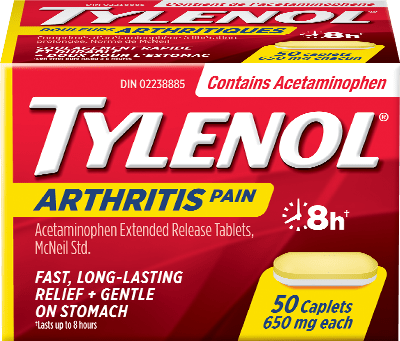Introduction:
Living with arthritis can be painful and frustrating since it affects your joints and can make even basic movements complex. Fortunately, there are a number of drugs, including Tylenol Arthritis, that can be used to treat Osteoarthritis, Rheumatism, Rheumatoid arthritis symptoms.

In order to reduce the discomfort and swelling brought on by arthritis, it is an over-the-counter painkiller. The advantages of Tylenol Arthritis, its mechanism of action, and any potential negative effects will all be covered in this article.
What is Tylenol Arthritis?
Acetaminophen, a prominent ingredient in Tylenol Arthritis, is a painkiller and fever reducer used to treat mild to moderate pain. As opposed to conventional Tylenol, it is made with a higher concentration of acetaminophen, which makes it more potent at treating arthritis-related pain and inflammation.
Composition of Tylenol Arthritis
Active Ingredients and Purpose:
- Acetaminophen 650 mg: Pain reliever
Inactive ingredients:
- Carnauba wax
- Cellulose
- Corn starch
- D&C yellow no. 10
- FD&C yellow no. 6
- Hydroxyethyl cellulose
- Hypromellose
- Magnesium stearate
- Microcrystalline cellulose
- Povidone
- Sodium starch glycolate
- Triacetin
These inactive ingredients are commonly used in pharmaceutical products to help bind the medication together, create a consistent texture and color, and aid in the absorption of the active ingredient. It is important to note that while these ingredients are generally considered safe, some people may have allergies or sensitivities to certain components. It is always best to check the label and talk to a doctor if you have any concerns about the ingredients in Tylenol Arthritis or any other medication.
What are the effects of Tylenol Arthritis?
Prostaglandins are bodily molecules that trigger pain and inflammation, and Tylenol Arthritis acts by preventing their synthesis. Tylenol Arthritis can effectively treat joint pain and stiffness by decreasing the body’s production of prostaglandins.
What are the Benefits of Tylenol Arthritis?
- Relieves joint pain: Tylenol Arthritis is a pain reliever made especially for arthritis sufferers to lessen the pain and inflammation associated with this condition.
- Easily accessible: Tylenol Arthritis is an over-the-counter treatment that is available at most drugstores, making it simple for individuals who need it to find.
- Has few adverse effects: Tylenol Arthritis, when used as prescribed, has few side effects and is usually regarded as safe for most people.
- It can be taken along with other drugs, including prescription arthritis medications, making Tylenol Arthritis a flexible pain reliever for controlling arthritic symptoms.
What are the Potential Side effects of Tylenol Arthritis?
Even while Tylenol Arthritis is generally regarded as safe when used as advised, some people may experience negative effects. They might consist of:
- Vomiting and nauseous
- stomach ache
- Headache
- Dizziness
- Allergic reaction (rare)
Particularly if you have any pre-existing medical conditions, it is crucial to always abide by the dosage recommendations on the label and consult your doctor before using Tylenol Arthritis.
What is the Difference Between Tylenol and Tylenol Arthritis?
The main difference between Tylenol and Tylenol Arthritis is the dosage of acetaminophen in each medication. Regular Tylenol contains 325mg of acetaminophen per tablet, while Tylenol Arthritis contains 650mg of acetaminophen per tablet. This higher dosage of acetaminophen in Tylenol Arthritis is specifically formulated to provide more effective pain relief for those suffering from arthritis pain and inflammation.
Another difference between the two medications is the types of pain they are recommended for. Regular Tylenol is generally used for mild to moderate pain relief, including headaches, toothaches, and menstrual cramps. Tylenol Arthritis, on the other hand, is specifically formulated for joint pain and stiffness associated with arthritis.
Additionally, Tylenol Arthritis may have different inactive ingredients than regular Tylenol, which can affect how the medication is absorbed and processed by the body. It is important to always read the label and consult with a doctor before taking any medication, especially if you have pre-existing medical conditions or take other medications.
FAQs:
Is Tylenol Arthritis effective for treating other types of pain?
Although Tylenol Arthritis is designed to treat the pain and inflammation associated with arthritis, it can also be used to treat headaches, menstrual cramps, and toothaches, among other types of pain.
What is the recommended dosage of Tylenol Arthritis?
A dose of two tablets every eight hours, not to exceed six tablets in a 24-hour period, is advised for Tylenol arthritis.
Is it safe to combine Tylenol Arthritis with other medications?
Tylenol Arthritis can be taken with other medications, but it’s crucial to consult with your doctor or chemist beforehand, particularly if you take prescription drugs or have any pre-existing medical conditions.
Conclusion:
To sum up, Tylenol Arthritis is a well-known over the counter drug that can effectively relieve joint pain and inflammation brought on by arthritis. Its high acetaminophen dosage and lack of adverse effects make it a secure and practical choice for anyone wishing to control their arthritic symptoms. Even more so if you have any pre-existing medical conditions, it is crucial to follow the directions exactly and see your doctor before using it. You can obtain relief from joint pain and inflammation with Tylenol Arthritis and resume your favorite activities.